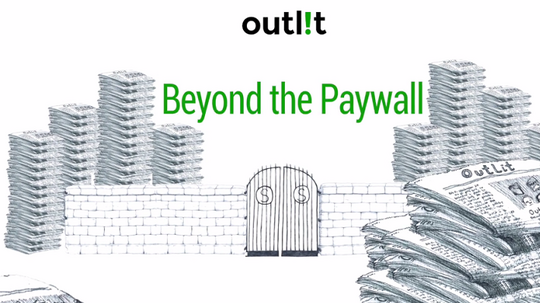
Arlington-based startup Outlit wants to do for the news what Apple's iTunes did for music. As iTunes changed the music industry by selling songs by the track instead of in albums on iTunes, Outlit sells stories and articles individually rather than with traditional subscriptions for a whole periodical. Instead of buying a subscription to the Baltimore Sun or Chicago Tribune, you can read just the stories you're interested in, paying as little as a nickel for a story. The cost varies depending on the article, with the entire platform revolving around paying for the articles without having any advertising or subscription fees the way most traditional news outlets do online.
"We're trying to think beyond the paywall for making content pay," said Outlit CEO Lucien Zeigler. "The question is, are people going to pay for news by the article instead of an up-front subscription? We think that content has value even without ads."
"We're trying to think beyond the paywall for making content pay"
Outlit raised an undisclosed amount of capital in a round of seed funding earlier this year, but the platform is already generating income, splitting revenue from people reading the articles with those who publish on the platform. There are about 40 or so newspapers and magazines on the site, including many from the Tribune Media empire. Publishers get different cuts of the revenue depending on if they are paying Outlit to publish or just taking a straight percentage of the reading fee. Publishers can also choose to donate some of what they make to a selection of charities. The goal is to have around 300 different publications on the site by the end of the summer, Zeigler said.
But Outlit isn't just aimed at newspaper and magazine stories that are already getting published elsewhere. It offers to publish any blogger or freelance writer's stories for free on the website, with the writer getting 80 percent of any revenue.. Zeigler said the idea is to draw in established and up-and-coming writers to publish on the site, letting them compete on the same level as articles from newspapers and magazines while using Outlit to build their audiences.
"We're deliberately positioning ourselves as a friend not just to publishers but to individual journalists," Zeigler said. "Here, we can let the market decide the value of the stories."
Of course, Outlit is not the first company to create the pay-as-you-go model of journalism, but Zeigler, who said that Outlit is already the largest company with this model in the country, thinks his company can stand out through a combination of variety of content and the ad-free nature of the reading experience.
"What's striking is how enjoyable it is to read without ads and pop-ups," Zeigler said. "It makes for much smoother online reading."
No matter how good an online media platform is though, the entire history of the Internet could arguably be about the atomization of media and the reluctance of people to pay for any online content. Try searching online for ways to get around paywalls and other limits, and you'll find there are plenty of people willing to use workarounds to beat those systems. That's part of how advertising and sponsorships became so ingrained into online media to begin with. What Outlit is counting on is that online media has matured enough so that people will recognize that the content they enjoy can't exist without some kind of financial foundation. Plenty of journalists and media companies have been hoping for the same thing. Now, Outlit's very existence will test that proposition.
"People have slowly embraced the need to pay for their favorite content but that doesn't mean they want to subscribe to a newspaper or magazine," Zeigler said. "I'm excited for content to compete on its own merit."
Check out Outlit's video on how the system works below.




